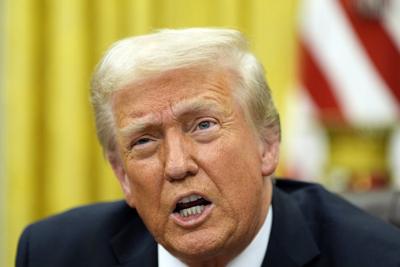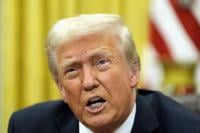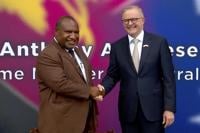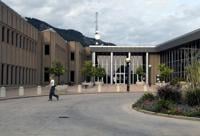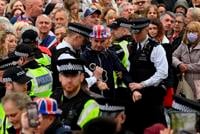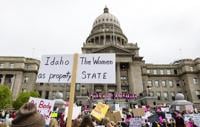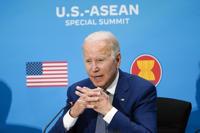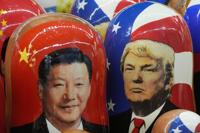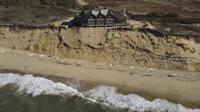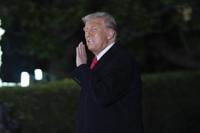WASHINGTON (AP) — In the first three weeks of his administration, President Donald Trump has moved with brazen haste to dismantle the federal government's public integrity guardrails that he frequently tested during his first term and now seems intent on removing entirely.
In a span of hours on Monday, word came that he had of offices responsible for government ethics and whistleblower complaints. And in a boon to corporations, he ordered a pause to enforcement of a decades-old law that prohibits American companies from paying bribes to win business in foreign countries. All of that came on top of the earlier late-night purge of who are tasked with rooting out waste, fraud and abuse at government agencies.
It's all being done with a stop-me-if-you-dare defiance by a president who the first time around felt hemmed in by watchdogs, lawyers and judges tasked with affirming good government and fair play. Now, he seems determined to break those constraints once and for all in a historically unprecedented flex of executive power.
“The end goal is to avoid accountability this time,” said Princeton University presidential historian Julian Zelizer. “Not just being protected by his party and counting on the public to move on when scandals or problems emerge, but this time by actually removing many of the key figures whose job it is to oversee” his administration.
Zelizer added: “It’s a much bolder assertion than in his first term, and if successful and if all these figures are removed, you'll have a combination of an executive branch lacking independent voices that will keep their eye on the ball and then a congressional majority that at least thus far isn’t really going to cause problems for him.”
To some degree, Trump's early actions reflect a continuation of the path he blazed in his first term, when — including those leading the Defense Department and intelligence community — and and amid a Justice Department investigation into his ties between his 2016 presidential campaign and Russia.
This time, though, his administration has moved much more swiftly in reprisal against those he feels previously wronged him — or still could.
His Justice Department last month — one into his hoarding of classified documents, the other into his efforts to undo the 2020 presidential election — that resulted in since-abandoned indictments after he left office. It's also who participated in investigations related to the , with Trump saying Friday that he intends to quickly and “surgically” fire some of them.
The actions reflect the administration's intent to keep a tight grip on the Justice Department and even purge it of investigators seen as insufficiently loyal, even though career civil servants are typically not replaced by new presidents. Trump's actions are in keeping with the dramatic dismissal on his first Friday night in office of of government agencies, all in seeming violation of a law requiring that Congress be given 30-day advance notice of such firings.
The latest moves came Monday, when the recently fired head of the Office of Special Counsel, which processes whistleblower complaints and handles the Hatch Act that prohibits federal employees from partisan activities on the job, sued over his dismissal days earlier. Trump separately fired the head of the Office of Government Ethics.
“Together, these actions will streamline any efforts he and his administration make to personally profit, install loyalists and avoid oversight of corruption and waste,” Donald Sherman, the executive director and chief counsel for the good-government group Citizens for Responsibility and Ethics in Washington, said in a statement. "By all indications, Trump is planning to run a lawless administration and these unprecedented moves are an alarming first step to put those plans into action.”
Trump, who in 2016 campaigned on a pledge to rid Washington of corruption with his “drain the swamp” refrain, has also taken aim at ethics and watchdog rules when it comes to business. On Monday, he paused enforcement of the Foreign Corrupt Practices Act, a 1977 law that prevents U.S. companies from paying bribes to foreign government officials to win business, until new Attorney General Pam Bondi can design new rules.
The White House said the action was needed because American companies “are prohibited from engaging in practices common among international competitors, creating an uneven playing field.”
“It sounds good on paper but in practicality it’s a disaster,” Trump said at the White House.
On his first day in office last month, Trump signed an executive order that rescinded one issued by former President Joe Biden that had prohibited executive branch employees from accepting major gifts from lobbyists and bans people jumping from lobbying jobs to executive branch jobs, or the reverse, for two years. The bans were aimed at curbing the “revolving door” in Washington, where incoming government workers could bring a minefield of ethical conflicts and later find lucrative lobbying jobs.
The move came as Trump returned to power with fresh overlaps between his personal and business interests, including his launch of a new cryptocurrency token.
His family business, the Trump Organization, meanwhile, adopted a voluntary agreement that bars it from making deals with foreign governments but not with private companies abroad, a significant change from the company’s ethics pact in the first term.
The Trump Organization has in recent months struck deals for hotels and golf resorts in Vietnam, Saudi Arabia and the United Arab Emirates. Government ethics experts have raised concerns that the president’s personal financial interests in the deals could influence the way he conducts foreign policy.

